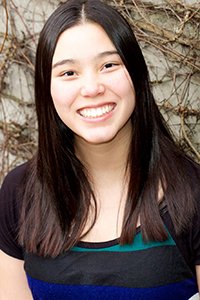Cognition/Perception Student Scores a Hat Trick of Honors
 |
| Brianna Yamasaki |
Brianna Yamasaki, currently completing her Ph.D. in Cognition and Perception with Dr. Chantel Prat, has been raking in the honors over the past year. Brianna descibes this remarkable year of awards below.
My research and teaching practices are guided by a passion for understanding and supporting individual differences in thinking and language abilities. This passion has led my program of research through a series of studies in which I explore the factors that lead to individual differences in reading ability. For example, my dissertation research investigates a novel model of second-language English reading ability. Many current models of second-language reading ability focus on factors that are known to relate monolingual reading ability. While it has been shown that these factors are important, one novel aspect of my model is that it incorporates aspects unique to the bilingual reader, such as the influence of having to manage two language systems and the cross-linguistic interactions between them. Looking forward, I hope that my work will provide a better understanding of the factors that may interfere as individuals try to read and learn in a second language. Hopefully, the understanding gained through my dissertation research will be used to develop interventions that can ease or eliminate the barriers students encounter in such situations.
This last year, I was fortunate to receive the Stroum Endowed Minority Fellowship through the Graduate Opportunities and Minority Achievement Program (GO-MAP) of the Graduate School at the University of Washington. This fellowship provided support so I could focus on my dissertation research this year. In addition, it provided networking opportunities and exposure to valuable university resources. GO-MAP facilitates writing groups for their dissertation fellows each year. My writing group provided an opportunity to get feedback on my own work from a diverse group of graduate students as well as exposure to a wide range of research being conducted by graduate students across the campus. Significantly, the group provided much needed peer support through the dissertation writing process from an interdisciplinary group of fellow graduate students. Recently, I was awarded the Earl and Mary Lou Hunt Endowed Graduate Fellowship from the Psychology Department. This fellowship will allow me to complete my dissertation this summer. The time and resources provided by the Stroum and Hunt fellowships have been, and will be, invaluable in helping me complete my dissertation and launch my career in psychological science.
My research experiences have helped to develop my strong appreciation for educational equity and my teaching philosophies have been built upon this perspective. Specifically, my teaching practices are guided by a goal of maximizing the learning success of all of my students. To accomplish this goal, I work to be creative in the ways in which I urge my students to engage with class material. Last summer, I taught a Cognitive Neuroscience course which paired traditional lectures on electroencephalography (EEG), with a tour of an EEG lab where students were able to talk to a researcher about the work her lab is doing with EEG, and an interactive in-class demonstration where students got the opportunity to record their own brain activity with an EEG cap.
One of my favorite aspects of teaching is when you are working with a student, or a group of students, and you see that “aha” moment when they finally understand something they have been struggling with. These types of moments motivate my multi-media approach to teaching. My goal is for each student to achieve their “aha" moment by grasping concepts through the medium that is most accessible to them. Like my research, my teaching is aimed at identifying and breaking barriers that hold students back. Thus, my research experiences have helped to guide my teaching practices in this way. But, much of what I have learned about what it means to be an effective teacher has been through my experience working as a teaching assistant for a number of different courses and instructors in the Psychology Department. As a teaching assistant I have been exposed to many different models of teaching and through an active-learning process I have used this experience to guide my teaching practices. Given the number of amazing instructors and fellow teaching assistants I have worked with at the University of Washington, I felt honored to be awarded the Department of Psychology Distinguished Teaching Award in 2016. More astonishing, my students nominated me for and I received the University-wide University of Washington Excellence in Teaching Award in 2017. My mentors and teachers have played an immeasurable role in my journey as a graduate student, and when I get the opportunity to teach, I aim to make at least a small positive impact on my students. Being the recipient of these teaching awards means a great deal to me, as it represents me taking steps towards achieving this goal.
I feel fortunate to have had the opportunity to engage as both a researcher and teacher at the University of Washington and I am so thankful to the people and programs that have provided support for me to do this!
Supplemental Reading:
- Excellence in Teaching Award for graduate student instructors and/or teaching assistants.
- Ashwin Bhandiwad (Animal Behavior with Joseph Sisneros), Jessica Chen (Adult Clinical with Ronald Smith), Exu Anton Mates (Animal Behavior with Jim and Renee Ha), and Jose Ceballos (Cognition & Perception with Chantel Prat) also received fellowship awards from GO-MAP and shared their experiences.
- Graduate Opportunities & Minority Achievement Program (GOMAP)

